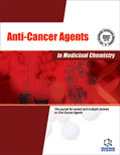
Anti-Cancer Agents in Medicinal Chemistry
Scope & Guideline
Empowering researchers with cutting-edge insights in oncology.
Introduction
Aims and Scopes
- Natural Product Research:
The journal publishes studies that explore the anticancer properties of compounds derived from natural sources, including plants and marine organisms, emphasizing their mechanisms of action. - Synthetic Chemistry and Drug Development:
Research focusing on the design and synthesis of novel chemical entities that exhibit anticancer activity, including structure-activity relationship studies and pharmacological evaluations. - Nanotechnology in Cancer Therapy:
Articles on the application of nanotechnology for drug delivery systems, enhancing the efficacy and specificity of anticancer agents. - Molecular Mechanisms of Cancer:
Investigations into the molecular pathways and mechanisms by which various agents exert their anticancer effects, including studies on apoptosis, cell cycle regulation, and signaling pathways. - Translational Research:
Research that bridges laboratory findings with clinical applications, including studies on drug repositioning, clinical trials, and patient outcomes related to new therapeutic agents.
Trending and Emerging
- Combination Therapies:
There is a growing interest in the synergistic effects of combining different therapeutic agents, including traditional drugs with novel compounds, to enhance treatment outcomes. - Immunotherapy and Targeted Therapy:
Research focusing on immunotherapeutic approaches and targeted therapies is on the rise, reflecting a broader trend in oncology towards personalized medicine. - Molecular Docking and Computational Studies:
The integration of computational methods in drug design and discovery is increasingly prevalent, enabling more efficient identification of promising anticancer agents. - Focus on Drug Resistance Mechanisms:
Emerging studies are increasingly addressing the mechanisms of drug resistance in cancer, aiming to develop strategies to overcome these challenges. - Plant-Derived Compounds and Phytochemicals:
There is a notable increase in research exploring the anticancer potential of phytochemicals and plant-derived compounds, highlighting their importance in drug discovery.
Declining or Waning
- Traditional Chemotherapy Agents:
Research focused on conventional chemotherapy agents appears to be waning, with a noticeable shift toward exploring novel compounds and alternative therapies. - Single-Agent Therapies:
There is a declining emphasis on studies involving single-agent therapies, as the field moves towards combination therapies that enhance efficacy and reduce resistance. - Mechanistic Studies on Established Drugs:
The exploration of mechanisms of action for well-established anticancer drugs is less frequent, suggesting a pivot towards novel compounds and innovative therapeutic strategies.
Similar Journals

MOLECULAR PHARMACOLOGY
Advancing the Science of Drug ActionMOLECULAR PHARMACOLOGY, published by the American Society for Pharmacology and Experimental Therapeutics, is an influential peer-reviewed journal dedicated to advancing the field of pharmacology through comprehensive research on molecular mechanisms of drug action. With an impressive historic convergence from 1965 to 2024, this journal plays a pivotal role in disseminating high-quality research, showcasing significant findings that impact both clinical and experimental pharmacology. Notably, it holds a distinguished Q1 ranking in Pharmacology and a Q2 ranking in Molecular Medicine as of 2023, reflecting its prominence in the academic community. Researchers and practitioners engaged in pharmacological studies will benefit from the journal’s focus on new therapeutic strategies, drug development, and the molecular basis of drug action. While MOLECULAR PHARMACOLOGY is not an open-access journal, it offers a wealth of knowledge behind a subscription model, ensuring that contributors and readers maintain a high standard of academic rigor. Address all inquiries to the editorial office located at 9650 Rockville Pike, Bethesda, MD 20814-3995, United States.
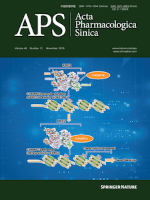
ACTA PHARMACOLOGICA SINICA
Exploring the Depths of Pharmacological InnovationACTA PHARMACOLOGICA SINICA is a premier journal in the field of pharmacology, published by the esteemed Nature Publishing Group. With a strong history since its inception in 1980, this journal is recognized for its impactful contributions to the fields of medicine and pharmacology, consistently securing a Q1 ranking in multiple relevant categories, including Pharmacology (Medical). Drawing on a robust international readership, it ranks impressively at #8 out of 272 in the specialty of Medical Pharmacology, placing it in the top 97th percentile according to Scopus data. Although currently not an open-access publication, ACTA PHARMACOLOGICA SINICA remains a vital resource for researchers, professionals, and students seeking to advance their understanding of pharmacological sciences. Its commitment to disseminating high-quality research underscores its significance in fostering innovation and exploration in the medical landscape.

RUSSIAN JOURNAL OF BIOORGANIC CHEMISTRY
Exploring the Intersection of Life and ChemistryRussian Journal of Bioorganic Chemistry (ISSN: 1068-1620, E-ISSN: 1608-330X), published by MAIK Nauka/Interperiodica/Springer, serves as a vital resource for researchers and professionals in the fields of bioorganic chemistry, biochemistry, and organic chemistry. With a focus on the integration of organic chemistry principles with biological processes, this journal aims to disseminate significant findings and advancements from both theoretical and practical perspectives. Although currently not open access, the journal retains a dedication to high-quality, peer-reviewed content, contributing to its reputation within the academic community. The 2023 Scopus rankings position it within the Q4 category for both biochemistry and organic chemistry, indicating its critical niche within these disciplines amid a competitive landscape. Since its inception in 1996, the journal has continued to evolve, providing enriching insights and fostering collaborations among scholars and practitioners alike, with publication converging up to the year 2024. By exploring complex biomolecular interactions and the synthesis of biologically relevant compounds, the Russian Journal of Bioorganic Chemistry remains a significant platform for advancing knowledge and innovation in the life sciences.
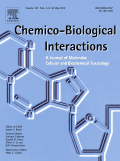
CHEMICO-BIOLOGICAL INTERACTIONS
Exploring the Nexus of Chemistry and BiologyCHEMICO-BIOLOGICAL INTERACTIONS is a premier journal published by Elsevier Ireland Ltd, dedicated to advancing the field of chemical and biological interactions since its inception in 1969. With a robust focus on pharmacology and toxicology, the journal holds a prestigious Q1 ranking in both Medicine (miscellaneous) and Toxicology, reflecting its significance in disseminating influential research. As part of the Scopus database, it ranks #21 out of 133 journals in Toxicology, positioning it in the 84th percentile and ensuring high visibility for cutting-edge studies. This scholarly platform serves as a crucial resource for researchers, professionals, and students who seek reliable and innovative findings at the intersection of chemistry and biology. While currently not open access, CHEMICO-BIOLOGICAL INTERACTIONS provides a comprehensive collection of articles that contribute to the ongoing dialogue in toxin research and its implications on medicinal chemistry, thereby fostering advancements in public health and safety.
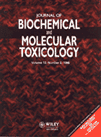
JOURNAL OF BIOCHEMICAL AND MOLECULAR TOXICOLOGY
Advancing the Frontiers of Toxicology and BiochemistryJournal of Biochemical and Molecular Toxicology, published by Wiley, plays a pivotal role in the advancement of knowledge within the fields of biochemistry, toxicology, and molecular biology. Established in 1998, this esteemed journal has garnered a significant reputation, evidenced by its current placement in the Q2 quartile across several categories, including Biochemistry, Health, Toxicology and Mutagenesis, and Medicine. With an ISSN of 1095-6670 and an E-ISSN of 1099-0461, it serves an international audience, offering critical insights and innovative research that shape our understanding of biochemical interactions and toxicological assessments. While it does not operate on an open-access model, the journal ensures rigorous peer review and high-quality publication standards, making it a valuable resource for researchers, professionals, and students dedicated to the exploration of molecular toxicology. The journal's recognized impact within the scientific community is reflected in its competitive rankings among specialized journals, fostering significant contributions to both academic and applied contexts.
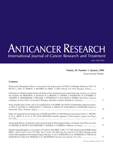
ANTICANCER RESEARCH
Illuminating Paths in Cancer Treatment and PreventionANTICANCER RESEARCH, published by the International Institute of Anticancer Research, stands at the forefront of cancer-related scholarly communication. With ISSN 0250-7005 and E-ISSN 1791-7530, this esteemed journal has been serving the global research community since 1981, showcasing innovative research aimed at combating cancer through various therapeutic approaches and scientific inquiry. Based in Greece, the journal aims to disseminate vital findings in the fields of Cancer Research, Medicine, and Oncology, reflecting its notable categorization in the Q3 and Q2 quartiles as of 2023. Despite its rigorous peer-review process and the absence of open access, ANTICANCER RESEARCH remains a vital publication for researchers, clinicians, and students eager to stay updated on the evolving landscape of anticancer strategies. As it converges to its milestone year of 2024, the journal continues to enrich the discourse around cancer treatment and prevention, affirming its position as an essential resource for those dedicated to advancing knowledge in anticancer therapies.
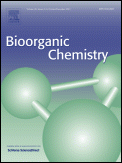
BIOORGANIC CHEMISTRY
Catalyzing advancements in drug discovery and biochemistry.BIOORGANIC CHEMISTRY, published by Academic Press Inc., a prestigious imprint of Elsevier Science, represents a cornerstone in the fields of biochemistry, organic chemistry, and drug discovery. With an impressive Scopus rank placing it in the top quartiles across critical categories—including Q2 for Biochemistry and Drug Discovery, and Q1 for Organic Chemistry—this journal has established itself as a vital resource for researchers, professionals, and students alike. Featuring a diverse array of articles that explore innovative methodologies and emerging trends from 1971 to the present, BIOORGANIC CHEMISTRY effectively bridges the gap between laboratory research and practical applications. Although not an Open Access journal, its rigorous peer-review process ensures the delivery of high-quality, impactful research that drives advances in the understanding and application of biochemistry. With an aim to facilitate scientific discourse and collaboration, it invites contributions that further the exploration of chemical processes within biological systems.

JOURNAL OF BIOLOGICAL REGULATORS AND HOMEOSTATIC AGENTS
Bridging Gaps in Biomedical Knowledge since 1987.JOURNAL OF BIOLOGICAL REGULATORS AND HOMEOSTATIC AGENTS, published by BIOLIFE SAS, is a pivotal platform in the fields of Cancer Research, Endocrinology, Immunology, and Physiology, addressing fundamental aspects of biological regulation and homeostasis. Since its inception in 1987, this journal has consistently contributed to the advancement of knowledge, showcasing innovative research and breakthroughs that are instrumental for professionals, researchers, and students alike. Although categorized in the Q4 quartile across multiple disciplines, the journal offers a unique perspective that encourages exploration into underrepresented areas, underscoring its role in fostering scientific dialogue and collaboration. With ISSN 0393-974X and E-ISSN 1724-6083, the journal remains a crucial resource for those invested in understanding the complexities of homeostatic agents and their implications in health and disease. Based in Silva Marina, Italy, it invites contributions that broaden the horizons of contemporary biomedical research.

Iranian Journal of Pharmaceutical Research
Championing excellence in pharmacological research and discovery.Welcome to the Iranian Journal of Pharmaceutical Research, a pioneering publication in the field of pharmacology, toxicology, and pharmaceutics, published by BRIEFLAND. Established in 2002, this journal has been a crucial platform for disseminating innovative research and scholarly articles, contributing significantly to the advancement of pharmaceutical sciences in Iran and beyond. With an impressive trajectory leading towards a convergence of knowledge by 2024, it proudly holds a Q3 ranking in Pharmacology (Medical) and a Q2 ranking in the broader realm of Pharmacology, Toxicology, and Pharmaceutics for 2023. The journal's influence is underscored by its Scopus rank of #25/80 in General Pharmacology, Toxicology, and Pharmaceutics, placing it within the 69th percentile, therefore appealing to researchers, professionals, and students alike. Although the journal operates under a non-open access model, it remains dedicated to providing high-quality research articles that explore the latest advancements in pharmaceutical sciences, making it an essential resource for anyone involved in this vibrant field of study.
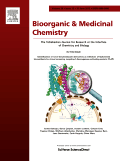
BIOORGANIC & MEDICINAL CHEMISTRY
Connecting Molecular Insights to Clinical ApplicationsBIOORGANIC & MEDICINAL CHEMISTRY, published by Pergamon-Elsevier Science Ltd, is a prominent journal in the fields of biochemical research and drug discovery, with an ISSN of 0968-0896 and an E-ISSN of 1464-3391. Established in 1993, it has garnered respect and recognition, evidenced by its categorization in various quartile ranks across 2023, including Q2 in Clinical Biochemistry and Pharmaceutical Science. It holds significant Scopus rankings, placing it in the 75th percentile in Pharmaceutical Science and 74th percentile in Organic Chemistry, highlighting its influential contributions to ongoing research and developments. This journal provides a platform for disseminating advancements in bioorganic and medicinal chemistry, focusing on innovative methodologies, therapeutic advancements, and molecular pharmacology. Although it does not follow an open-access model, it remains a key resource for researchers, professionals, and students aiming to stay at the forefront of scientific discovery in the UK and beyond. The journal’s commitment to enhancing knowledge within the biomedical community makes it an essential read for those passionate about this dynamic field.